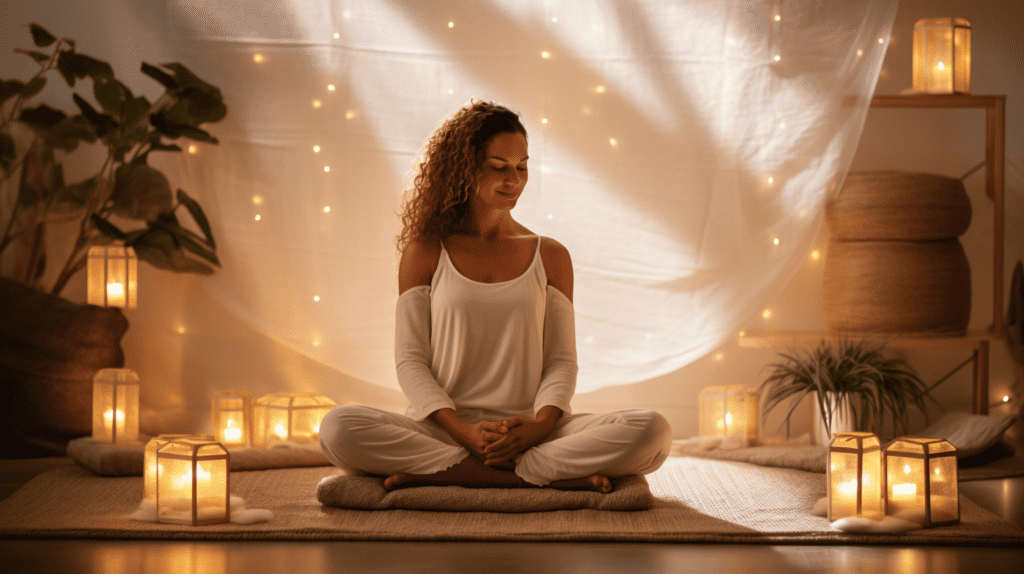Have you ever heard that meditation boosts mood and propels healthier sleep habits? Well, research backs this up, too! This blog post aims to be your ultimate pocket guide for exploring the awe-inspiring power of meditation practices for pacifying stress.
So, are you all set to delve deeper into the power of meditation practices for stress relief?
Key Takeaways
- Meditation is a powerful practice that can help reduce stress and anxiety, improve overall well-being, and promote mindfulness and self-awareness.
- Stress is a natural response to challenging situations and can cause physical and emotional tension. Chronic stress can lead to serious health problems.
- Common responses to stress include feeling upset or angry, worrying often, having problems sleeping, eating too much or too little, holding your breath or breathing fast, feeling run-down or tired all the time, and getting sick more often.
- Meditation has numerous benefits for stress relief, including reducing stress hormones, improving mental and emotional balance, enhancing overall well-being, and promoting mindfulness and self-awareness.
Guided Meditations for Stress Relief
Guided meditations can be a powerful tool for relieving stress and promoting relaxation. These structured meditation sessions are led by an experienced teacher or through audio recordings, allowing you to follow along and focus your mind.
By providing specific instructions and guidance, guided meditations help to calm your thoughts and ease tension in both the body and mind. Whether it’s a body scan meditation, a breathing practice for anxiety, or a loving-kindness meditation, these guided sessions offer effective techniques for reducing stress levels and finding inner peace.
Body scan meditation
Body scan meditation is a powerful practice that can help us become more aware of our bodies and reduce stress. It involves focusing on different body parts, starting from the top of the head and moving down to the toes.
As we gently scan each area, we notice any sensations or tension that may be present without judgment. This practice promotes relaxation and helps us profoundly connect with our bodies.
Research has shown that body scan meditation can lower stress levels and even decrease anxiety. So, if you’re looking for an effective way to relax and find inner peace, give body scan meditation a try!
Breathing practice for anxiety
When it comes to managing anxiety, one effective breathing practice that can help is deep breathing. Deep breathing meditation focuses on taking slow, deep breaths to promote relaxation and reduce stress.
By engaging in this practice, you can disengage from distracting thoughts and sensations, allowing your mind and body to find calmness and peace. Research has shown that deep breathing can be beneficial for treating symptoms of anxiety and depression.
It works by activating the body’s relaxation response, which helps to control the stress response and alleviate feelings of anxiety. So, the next time you feel overwhelmed or anxious, try taking a moment to focus on your breath and engage in some deep breathing exercises.
Loving-kindness meditation
Loving-kindness meditation is a powerful practice that helps us cultivate focus and compassion. It has been shown to improve mindfulness, empathy, and communication skills. This type of meditation can also be helpful for symptoms of depression.
By directing love and kindness towards ourselves and others, loving-kindness meditation can potentially reduce stress and enhance overall well-being. This practice is often found in Buddhist traditions to develop kindness towards oneself and others.
Understanding Stress
Stress naturally responds to challenging or threatening situations, causing physical and emotional tension. It can manifest as irritability, fatigue, headaches, and difficulty concentrating.
The impact of stress on the body can be detrimental to overall health and well-being. According to Mayo Clinic, chronic stress can contribute to serious health problems such as heart disease, high blood pressure, diabetes, and mental disorders like anxiety and depression.
Therefore, understanding stress is crucial for finding effective ways to manage it.
Definition of stress
Stress is like a big, heavy bag that we carry around. Think of it as bad feelings caused by challenging situations. It shows up when something in life is too hard to handle. We all feel stress from time to time because things often don’t go how we want them to.
Imagine having a massive test at school or getting lost in a new city! These things make your heart beat fast and your body sweat. It’s normal, but when stress stays for many days, it can hurt our bodies and make us sick.
Take me for example–once I had so much work, I was feeling stressed every day for weeks! My head hurt, and my stomach felt terrible until I found ways to relax and calm down again.
Common responses to stress
Stress affects us all in different ways. Here are some common responses to stress:
- Feeling upset or angry
- Worrying often
- Having problems sleeping
- Eating too much or too little
- Holding your breath or breathing fast
- Feeling run-down or tired all the time.
- Getting sick more often
The impact of stress on the body
Stress can hurt our bodies in significant ways. It makes our hearts work too hard. This can lead to high blood pressure and heart problems. Stress also stops us from sleeping well, so our brains cannot rest and recharge.
It is not just about how we feel inside. Too much stress can change how we look! We may eat too much or not enough when stressed. Our hair might even start falling out! And being stressed all the time keeps us from fighting off sickness like colds or the flu very well.
So it is vital to find ways to reduce stress wherever possible for our health’s sake.
Benefits of Meditation for Stress Relief

Meditation has numerous benefits when it comes to relieving stress. It can help reduce stress and anxiety levels, improve overall well-being, and promote mindfulness and self-awareness.
Through meditation, individuals can find peace and calm within themselves, allowing them to better cope with the demands of everyday life (www.mindful.org).
Reduces stress and anxiety
Meditation is a powerful practice that can help reduce stress and anxiety. When we meditate, we take the time to focus our attention on the present moment, which helps to calm our mind and relax our body.
Research has shown that meditation can decrease the levels of stress hormones in our body, such as cortisol, and increase feelings of relaxation and well-being. Additionally, by practicing mindfulness during meditation, we learn to observe our thoughts without judgment, which can help us manage anxious thoughts and emotions more effectively.
Meditation is a simple yet effective way to promote mental and emotional balance, allowing us to navigate through life’s challenges with greater ease.
Improves overall well-being
Meditation has a powerful impact on our overall well-being. It can help us feel more balanced, peaceful, and content daily. When we practice meditation regularly, it becomes a valuable tool for managing stress and improving our mental and physical health.
Research suggests that meditation may reduce symptoms of anxiety, depression, and pain. It can also enhance emotional regulation, attention span, memory, and mood. By taking the time to sit quietly and focus on the present moment, we cultivate a sense of inner peace and mindfulness.
Incorporating meditation into our wellness routine can profoundly affect our overall well-being. Whether through mindfulness meditation or other techniques like body scans or breathing exercises, regular practice allows us to connect with ourselves on a deeper level.
Promotes mindfulness and self-awareness
Meditation is a powerful practice that promotes mindfulness and self-awareness. When we meditate, we take the time to quiet our minds and focus on the present moment. This helps us become more aware of our thoughts, emotions, and sensations in the body.
By cultivating this awareness, we can better understand ourselves and how we relate to the world. Meditation allows us to observe our thoughts without judgment or attachment, which can lead to a greater sense of clarity and inner peace.
Additionally, research suggests regular meditation can improve attention span, emotional regulation, and overall well-being. So whether you’re new to meditation or have been practicing for a while, incorporating mindfulness into your daily life can profoundly benefit your mental and emotional health.
Types of Meditation
Various types of meditation practices can help you find stress relief and improve your overall well-being. From mindfulness meditation to breathing and mantra meditation, each technique offers its unique benefits.
To learn more about these different types of meditation and how they can enhance your life, keep reading!
Mindfulness meditation
Mindfulness meditation is a powerful practice that has helped me find inner peace and reduce stress. It involves focusing on the present moment and being aware of our thoughts, feelings, and sensations without judgment.
By cultivating this mindfulness, we can learn to respond to stressful situations with clarity and intention. Research has shown that mindfulness meditation can positively change our brain and biology, improving mental and physical health.
It’s a simple yet effective tool for managing stress and improving well-being.
Breathing meditation
Breathing meditation is a powerful way to reduce stress and promote relaxation. By simply observing your breath, you can calm your mind and bring yourself into the present moment. Research has shown that meditation, including breathing techniques, can help reduce anxiety, improve memory, and even treat symptoms of depression.
When practicing breathing meditation, you focus on your breath as it moves in and out of your body. Deep breathing exercises used in this type of meditation can slow down your breathing and relax both your physical body and your mind.
It’s a simple yet effective technique that can be done anywhere at any time to bring peace and tranquility.
Additionally, mindfulness meditation often incorporates breathing techniques. This practice has deep roots in ancient yogic traditions and is known for its ability to cultivate mindfulness and self-awareness.
By paying attention to each breath we take, we become more grounded in the present moment and better equipped to manage stress effectively.
Mantra meditation
Mantra meditation has been a powerful practice for centuries to calm the mind and deepen self-awareness. By repeating specific phrases or mantras during meditation, you can promote focus and intention while letting go of distressing emotions.
This type of meditation generates a relaxation response in the body and helps quiet the mind. It is simple yet effective, making it suitable for beginners and experienced meditators.
Scientific evidence even supports the health benefits of mantra meditation, showing that it can reduce stress and improve overall well-being. So, if you’re looking to find inner peace and enhance your spiritual journey, give mantra meditation a try!
Elements of Meditation
In the practice of meditation, several vital elements contribute to its effectiveness in reducing stress and promoting relaxation. These elements include posture and positioning, focus and intention, and breathing techniques.
Posture and positioning
When practicing meditation, it’s essential to pay attention to your posture and positioning. Finding a comfortable position is vital to a successful meditation session. You can choose from positions like sitting, standing, lying down, or walking.
If you decide to sit, there are various seated positions you can try, such as cross-legged on the floor or sitting on a cushion or chair. The goal is to find a posture that allows you to be relaxed yet alert.
By maintaining good posture and positioning during meditation, you can create a solid foundation for deep relaxation and concentration.

Focus and intention
To make the most of your meditation practice, it’s essential to have a clear focus and intention. This means directing your attention to a specific object or concept while meditating.
For example, you might focus on your breath or repeat a mantra in your mind. By having this focal point, you can train your mind to become more present and focused, which helps reduce stress and anxiety.
Having an intention for your meditation practice can also be helpful. This is like setting an intention or goal for what you want to achieve through meditation. It could be something as simple as finding inner peace or cultivating gratitude.
Whatever your intention, it provides direction and purpose to your meditation sessions.
When I meditate, I often focus on my breath and set an intention for peace and relaxation. This helps me let go of any stress or tension that may be weighing me down. By bringing my attention back to my breath whenever my mind wanders, I cultivate a sense of calmness and clarity.
Breathing techniques
I have found that breathing techniques can be a powerful tool for stress relief. Let me share with you some simple and effective techniques that you can try:
- Deep Breathing: Take slow, deep breaths, filling your lungs thoroughly and exhaling slowly. This technique helps to activate the body’s relaxation response and calm your mind.
- Diaphragmatic Breathing: Place one hand on your chest and the other on your belly. Breathe deeply through your nose, allowing your belly to rise as you fill your lungs with air. Exhale slowly through your mouth, feeling your belly sink back down. This technique encourages relaxation and stress reduction.
- 4-7-8 Breathing: Inhale quietly through your nose for a count of 4, hold your breath for a count of 7, then exhale forcefully through your mouth for a count of 8. Repeat this cycle several times, focusing on the rhythm of your breath. It helps to calm the nervous system and promote relaxation.
- Box Breathing: Visualize drawing a box in your mind with four equal sides. Inhale slowly for a count of 4 as you trace one side of the box mentally. Hold your breath for a count of 4 as you trace another side. Exhale for a count of 4 as you trace the third side, then hold again for a count of 4 as you complete the box. Repeat this pattern several times, maintaining a steady pace.
- Alternate Nostril Breathing: Close off one nostril with your thumb and inhale deeply through the other nostril. Close off that nostril with your ring finger or pinky finger while simultaneously releasing the thumb from the other nostril to exhale. Inhale again through that same nostril, then switch fingers to close off that nostril while releasing the other to exhale. Continue this alternating pattern, focusing on your breath.

Everyday Ways to Practice Meditation
Incorporate mindfulness into your daily activities, such as focusing on the sensations of eating or walking. Try guided meditations to help you carve out time for meditation and practice mindfulness throughout the day.
Carving out time for meditation
To experience the excellent benefits of meditation, it’s essential to set aside time for it. Even just a few minutes each day can make a big difference. Find a quiet space where you won’t be disturbed, and choose a time that works best for you.
It could be in the morning before starting your day or in the evening to unwind before bed. Making meditation a regular habit will help you overcome any obstacles, like being distracted by technology or feeling too busy.
Prioritize your well-being by carving out time for this peaceful practice every day.
Incorporating mindfulness into daily activities
Incorporating mindfulness into daily activities can help us reduce stress and cultivate inner peace. It’s important to remember that mindfulness is not just about sitting in meditation; it can be integrated into our everyday lives.
For example, when we eat, we can pay attention to the taste, texture, and smell of our food. Walking, we can focus on the sensation of each step and the feeling of the ground beneath our feet.
Additionally, we can bring mindfulness into household chores like washing dishes or folding laundry. Instead of rushing through these tasks mindlessly, we can take time to fully experience them by noticing the warm water on our hands or feeling the softness of freshly laundered clothes.
Guided meditations
Guided meditations are a helpful tool for beginners who want to try meditation. They provide instructions and focus points to help you stay engaged during your practice. These meditations can be found in various forms, such as audio recordings or apps, and cover different themes like stress relief or relaxation.
Guided meditations offer structure and guidance, making them particularly useful if you’re new to meditation. Following the prompts, you can quickly start your meditation journey and experience its benefits for reducing stress and finding inner peace.
Building Your Meditation Skills
Building your meditation skills is an essential step in finding stress relief and improving overall well-being. Start with short sessions and find a comfortable position to practice in.
Don’t let distractions deter your focus, and remember that progress takes time. Read on to learn how meditation can help manage stress and unlock its full potential for relaxation and self-awareness.
Starting with short sessions
When beginning a meditation practice, it’s essential to start with short sessions. This helps you ease into the practice and build your meditation skills. Starting with just five minutes of meditation each day can make a difference in reducing stress and promoting relaxation.
As you become more comfortable with this routine, you can gradually increase the duration of your sessions. By starting small and being consistent, you’ll experience the benefits of meditation and find it easier to incorporate into your daily life.
Finding a comfortable position
When meditating for stress relief, it’s essential to find a comfortable position. This can help you relax and focus better. You can sit or lie down in a way that feels good for your body.
Closing your eyes during meditation can also create a sense of inner peace. By finding a comfortable position, you set yourself up for a successful meditation practice and maximize the benefits of stress reduction.
So, take some time to experiment and discover what works best for you!

Dealing with distractions
Distractions can make it difficult to focus and find inner peace during meditation, but there are ways to handle them. One effective technique is to acknowledge the distractions without judgment and gently bring your attention back to your breath or chosen point of focus.
This practice helps train the mind to let go of distractions and return to the present moment. Another helpful approach is using visualization techniques, such as imagining a peaceful scene or repeating a calming mantra, which can help redirect your attention away from distractions.
Remember that dealing with distractions is a normal part of meditation, and with consistent practice, you will become better at staying focused and finding stillness within yourself.
Using Meditation to Manage Stress
Using meditation as a tool to manage stress can be incredibly beneficial for both your mental and physical well-being.
Practicing mindfulness throughout the day
Throughout the day, I find that practicing mindfulness helps me manage stress and interrupt the stress cycle. By staying present in the moment and paying attention to my thoughts and feelings without judgment, I can prevent stress from building up.
During everyday activities like eating, walking, or even doing chores, I take a few moments to focus on my breath or observe my surroundings. This helps me stay grounded and calms my mind.
Mindfulness doesn’t require any special tools or techniques – it’s simply a way of being fully engaged in the present moment. And research shows that incorporating mindfulness into our daily lives can improve our mental and physical health.
Breathing techniques for stress relief
Deep breathing is a powerful way to reduce stress and promote relaxation. Here are some simple techniques you can try:
- Take a deep breath through your nose, filling your lungs with air. Hold it for a few seconds.
- Slowly exhale through your mouth, releasing all the tension and stress.
- Breathe in deeply again, but this time, imagine you’re inhaling calmness and serenity.
- As you exhale, picture all the stress leaving your body with each breath.
- Sit or lie down in a comfortable position.
- Place one hand on your chest and the other on your belly.
- Take a slow breath through your nose, feeling your belly rise as you fill it with air.
- Exhale slowly through your mouth, feeling your belly go down as the air leaves.
- Inhale deeply for four seconds, imagining drawing a line up one side of a box.
- Hold your breath for four seconds as you imagine drawing a line across the top of the box.
- Exhale slowly for four seconds, visualizing drawing a line down the other side of the box.
- Hold your breath again for four seconds as you complete the bottom line of the box.

Mindful movement and exercise
Mindful movement and exercise can be powerful forms of meditation. When we engage in activities like hiking, yoga, or even simple exercises, we can bring our attention to the present moment.
Instead of letting our minds wander or getting caught up in stress and worries, we can focus on the sensations of our bodies moving and the rhythm of our breath. This mindful movement allows us to fully immerse ourselves in the activity, bringing a sense of calm and grounding.
By combining these practices with traditional meditation techniques, we can create a comprehensive approach to managing stress and promoting overall mental health. So next time you go for a walk or hit the gym, try bringing your awareness to each step or repetition – you might find that it becomes a form of meditation!
How Meditation Can Improve Overall Well-Being
Meditation has been shown to have a profound impact on overall well-being. Research suggests regular meditation can reduce stress, promote emotional balance, and improve mental clarity.
Incorporating meditation into your daily routine can provide calm and inner peace, helping you navigate life’s challenges more easily. Discover the transformative power of meditation and unlock a world of serenity and self-discovery.
Read more about how meditation can improve your well-being in this comprehensive guide.
Research on the benefits of meditation
Research has shown that meditation offers numerous benefits for our physical and mental well-being. Studies have found that regular meditation practice can reduce stress and anxiety, promoting a sense of calm and relaxation.
It improves sleep quality, helping with insomnia and other sleep-related issues. Meditation-based programs like Mindfulness-Based Stress Reduction (MBSR) and Mindfulness-Based Cognitive Therapy (MBCT) have been proven effective in reducing anxiety symptoms.
Not only does meditation benefit our emotional health, but it also enhances brain function. Research suggests it can improve memory, attention span, mood, and emotional regulation.
Moreover, meditation has positive effects on physical health as well. It lowers stress levels, which can lead to improved immune function and slows down the aging process related to the mind.
Incorporating meditation into a wellness routine
Meditation is a powerful practice that can be incorporated into your wellness routine. Here are some simple ways to do it:
- Start with short sessions: Begin by setting aside just a few minutes each day for meditation. As you become more comfortable, gradually increase the time you spend meditating.
- Find a comfortable position: Sit in a chair or on the floor, whichever position feels most comfortable. Keep your back straight and relax your shoulders.
- Dealing with distractions: It’s normal for thoughts to pop up during meditation. Instead of getting frustrated, acknowledge the thought and gently bring your attention back to your breath or mantra.
- Practicing mindfulness throughout the day: Bring mindfulness into your daily activities by paying full attention to what you’re doing in the present moment. Whether eating, walking, or washing dishes, focus on each sensation and experience fully.
- Breathing techniques for stress relief: Deep breathing is another way to incorporate meditation into your daily routine. Take slow, deep breaths in through your nose and out through your mouth, focusing on each breath as it enters and leaves your body.
- Mindful movement and exercise: Combine meditation with physical activity by practicing mindful movement or yoga. Pay close attention to each movement and sensation as you exercise gently.
Tips for beginning meditators
If you’re starting with meditation, here are some simple tips to help you get started:
- Find a quiet and comfortable space where you won’t be easily distracted.
- Start with short meditation sessions, even just 5 or 10 minutes at first.
- Sit in a relaxed position with your back straight and your feet on the ground.
- Focus on your breath, noticing the sensation of each inhale and exhale.
- Don’t worry if your mind wanders – gently bring your attention back to your breath.
- Use guided meditations or apps to help you stay focused and provide guidance.
- Be consistent with your practice – try to meditate simultaneously every day.
- Gradually increase the length of your sessions as you become more comfortable.
- Remember that meditation is a practice, so be patient and kind to yourself.
- Stay open-minded and experiment with different techniques to find what works best for you.
Conclusion on The Power Of Meditation Practices For Stress Relief
In conclusion, meditation is a powerful tool for stress relief and overall well-being. By practicing mindfulness and incorporating different techniques like breathing and body scan meditation, we can reduce stress levels, improve our mental health, and promote a sense of calmness in our lives.
Whether you’re new to meditation or an experienced practitioner, this comprehensive guide provides valuable insights and resources to help you harness the power of meditation for stress relief.
Start your journey towards inner peace today!
Q: What is meditation?
A: Meditation is a technique that involves focusing your mind on a particular object, thought, or activity to achieve a mentally clear and emotionally calm state.
Q: How can meditation help in stress reduction?
A: Meditation can help in stress reduction by activating the body’s relaxation response, reducing the release of stress hormones like cortisol, and promoting a sense of calm and well-being.
Q: What are some common meditation techniques?
A: Some common meditation techniques include mindfulness meditation, transcendental meditation, loving-kindness meditation, and guided visualization.
Q: Can meditation help in managing stress?
A: Yes, meditation can be an effective tool for stress management. It can help you become more aware of your stress triggers and teach you how to respond to stress in a healthier way.
Q: What is progressive muscle relaxation?
A: Progressive muscle relaxation is a relaxation technique that involves tensing and relaxing different muscle groups in your body to release tension and promote relaxation.
Q: How does meditation help in coping with stress?
A: Meditation helps in coping with stress by reducing stress reactivity, improving resilience, and promoting a state of calm and clarity that allows for more effective problem-solving and decision-making.
Q: Are there any health benefits associated with meditation?
A: Yes, there are several health benefits associated with meditation. It can help lower blood pressure, improve immune function, enhance sleep quality, and reduce symptoms of anxiety and depression.
Q: What is the relationship between mindfulness and meditation?
A: Mindfulness is a state of awareness that can be cultivated through meditation practice. Meditation helps train the mind to be more present and attentive, which in turn enhances mindfulness in everyday life.
Q: Can meditation be combined with other practices like yoga?
A: Yes, meditation can be combined with other practices like yoga. Many people find that combining meditation and yoga enhances the overall benefits of both practices for stress relief and overall well-being.
Q: How can I start practicing meditation?
A: You can start practicing meditation by finding a quiet and comfortable place, choosing a meditation technique that resonates with you, and committing to a regular practice schedule. It’s helpful to seek guidance from a meditation teacher or use meditation apps or resources to get started.





Leave a Reply